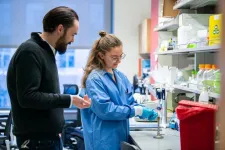(Press-News.org) A million years ago, the oldest known species to walk upright like a human, the Homo Erectus, had a human-like fascination with crystals. Historians can even pin down the possible reasons – crystals didn’t look like anything around at the time - trees, valleys, mountains. Crystals were a material to ponder, a fascinating diversion for the mind.
To this day, the human preoccupation with the magic of crystals continues to fill the mind’s eye of scientists who have developed ways to use crystals for everything from malaria cures to solar cells and semiconductors, catalysts and optical elements. Over the years crystals have become crucial constituents of the technologies that enable modern civilization.
So, for historians creating a timeline of crystal fascination and research spanning a million years, mark Jan. 2024 as the time that University of Houston researcher Peter Vekilov, Frank Worley Professor of Chemical and Biomolecular Engineering, published in PNAS an answer to how crystals are formed and how molecules become a part of them.
“For decades crystal growth researchers have dreamt of elucidating the chemical reaction between incoming molecules and the unique sites on a crystal surface that accept them, the kinks,” said Vekilov. The mechanism of that reaction, i.e., the characteristic time scale and length scale, possible intermediates and their stabilities, has remained elusive and subject to speculation for over 60 years.”
The main obstacle to deeper understanding has been the lack of data on how molecules join in, connected to the complicated process of moving from the solution to where they grow.
To unravel the chemical reaction between a molecule that dissolves in liquid (solute) and a kink, Vekilov mobilized two transformational strategies, one using full organic pairs and the second, using four solvents with distinct structures and functions. Working with the molecules, he combined state-of-the-art experimental techniques including time-resolved in situ atomic-force microscopy at near-molecular resolution, x-ray diffraction, absorption spectroscopy and scanning electron microcopy.
That’s when Vekilov made a revolutionary discovery: Incorporation into kinks may occur in two steps divided by an intermediate state and the stability of this middle state is key in how crystals grow. It basically decides how fast or slow the crystals form because it affects how easily things can join in during the process
Though the new discoveries don’t date back to Homo Sapien times, they do solve a 40-year-old riddle for Vekilov.
“The notions of an intermediate state and its decisive role in crystal growth refute and replace the dominant idea in the field, brought up by A.A. Chernov, my PhD advisor, that the activation barrier for growth is determined by the solute-solvent interactions in the solution bulk,” he said.
The new paradigm of two step incorporation, mediated by an intermediate state, could help in understanding how small parts in a liquid can influence the detailed shapes of crystals found in nature.
“Equally important, this paradigm will guide the search for solvents and additives that stabilize the intermediate state to slow down the growth of, for instance, undesired polymorphs,” Vekilov said.
Vekilov’s team includes Jeremy Palmer, Ernest J and Barbara M Henley Associate Professor of chemical and biomolecular engineering; former graduate students Rajshree Chakrabarti and Lakshmanji Verma; and Viktor G. Hadjiev, Texas Center for Superconductivity at UH.
END
Solving an age-old mystery about crystal formation
Incorporation of molecules occurs in two steps, divided by an intermediate state
2024-02-06
ELSE PRESS RELEASES FROM THIS DATE:
New research shows AI dog personality algorithm could match you with your new ‘best friend’
2024-02-06
A multi-disciplinary research team specializing in canine behavior and Artificial Intelligence has developed an AI algorithm that automates the high-stakes process of evaluating potential working dogs’ personalities. They hope to help dog training agencies more quickly and accurately assess which animals are likely to succeed long term in careers such as aiding law enforcement and assisting persons with disabilities. The personality test could also be used for dog-human matchmaking, helping shelters with proper placement, thus reducing the number of animals returned ...
In a warming world, climate scientists consider category 6 hurricanes
2024-02-05
– By Linda Vu
For more than 50 years, the National Hurricane Center has used the Saffir-Simpson Windscale to communicate the risk of property damage; it labels a hurricane on a scale from Category 1 (wind speeds between 74 - 95 mph) to Category 5 (wind speeds of 158 mph or greater).
But as increasing ocean temperatures contribute to ever more intense and destructive hurricanes, climate scientists Michael Wehner of Lawrence Berkeley National Laboratory (Berkeley Lab) and James Kossin of the First Street Foundation wondered whether the ...
Better together: Beckman imaging facilities share $3 million Alzheimer’s research grant
2024-02-05
What do a synthetic chemist, a medical imaging expert, and a neurologist have in common? They’re coming together in the Biomedical Imaging Center at the Beckman Institute for Advanced Science and Technology to develop better diagnostic tools and imaging agents to detect early-stage Alzheimer’s disease and other neurodegenerative diseases.
The dream team
A team led by Liviu M. Mirica along with Wawryzneic “Wawosz” Dobrucki and Dr. Daniel A. Llano received a $3 million grant from the U.S. National Institute on ...
$1.9 million NIH grant to support research on impacts of the microbiome on human health
2024-02-05
UNIVERSITY PARK, Pa. — The bacteria and microorganisms that live within the human body — the microbiota — can impact human health, disease risk and even how the body absorbs medications, but the details of these processes are unclear. To help understand how complex communities of microbes impact human health, the National Institutes of Health’s National Institute of General Medical Science has awarded a 5-year, $1.9 million Maximizing Investigator’s Research Award to Jordan Bisanz, assistant professor of biochemistry and molecular biology in the Penn State Eberly College of Science.
“It is clear that the diversity of microbes in the ...
First representative survey of energy insecurity in New York City
2024-02-05
Researchers at Columbia University Mailman School of Public Health and the New York City Department of Health and Mental Hygiene conducted the first representative survey of energy insecurity and health of New York City residents.
The study’s findings – including that energy insecurity is experienced by approximately 30 percent of New York City (NYC) residents – are published online and in print, in the February issue of the journal Health Affairs. The study and its results help officials understand challenges faced by residents and develop possible interventions and efforts in response.
Results ...
Primary care housing intervention linked to improved patient health outcomes
2024-02-05
Brigham researchers found that participation in a housing program was associated with fewer outpatient visits, improved physical and mental health, and stronger connections to their primary care clinics and care team.
Lack of safe and affordable housing is a critical issue in the United States and creates immense challenges for patients’ health, well-being, and ability to access care. Investigators from Brigham and Women’s Hospital, a founding member of the Mass General Brigham healthcare system, evaluated data from a social ...
MSU researchers find early, promising glioblastoma treatment
2024-02-05
MSU has a satellite uplink/LTN TV studio and Comrex line for radio interviews upon request.
EAST LANSING, Mich. – A team of Michigan State University scientists has unveiled a potential game-changer in the fight against glioblastoma, the most common and currently incurable form of brain cancer.
A team of Michigan State University scientists has unveiled a potential game-changer in the fight against glioblastoma, the most common and currently incurable form of brain cancer.
Their weapon of choice? ...
Are body temperature and depression linked? Science says, yes
2024-02-05
People with depression have higher body temperatures, suggesting there could be a mental health benefit to lowering the temperatures of those with the disorder, a new UC San Francisco-led study found.
The study, publishing today in Scientific Reports, doesn’t indicate whether depression raises body temperature or a higher temperature causes depression. It’s also unknown whether the higher body temperature observed in people with depression reflects decreased ability to self-cool, increased generation of heat from metabolic processes or a combination of both.
Researchers analyzed data from more than 20,000 international ...
Persons diagnosed with PCOS face 8-fold increase in suicide risk
2024-02-05
Embargoed for release until 5:00 p.m. ET on Monday 5 February 2024
Annals of Internal Medicine Tip Sheet
@Annalsofim
Below please find summaries of new articles that will be published in the next issue of Annals of Internal Medicine. The summaries are not intended to substitute for the full articles as a source of information. This information is under strict embargo and by taking it into possession, media representatives are committing to the terms of the embargo not only on their own behalf, but also ...
Mental health care during the COVID-19 era remains inaccessible to many distressed US adults
2024-02-05
U.S. adults experienced considerable psychological distress and adverse mental health effects as a result of the COVID-19 pandemic according to a study at Columbia University Mailman School of Public Health and Columbia University Irving Medical Center. Based on insurance claims, mental health care provider surveys, and electronic health records the research further revealed a decline in in-person outpatient mental health visits during the acute phase of the pandemic. Findings are reported ...
LAST 30 PRESS RELEASES:
Asteroid samples offer new insights into conditions when the solar system formed
Fecal transplants from older mice significantly improve ovarian function and fertility in younger mice
Delight for diastereomer production: A novel strategy for organic chemistry
Permafrost is key to carbon storage. That makes northern wildfires even more dangerous
Hairdressers could be a secret weapon in tackling climate change, new research finds
Genetic risk for mental illness is far less disorder-specific than clinicians have assumed, massive Swedish study reveals
A therapeutic target that would curb the spread of coronaviruses has been identified
Modern twist on wildfire management methods found also to have a bonus feature that protects water supplies
AI enables defect-aware prediction of metal 3D-printed part quality
Miniscule fossil discovery reveals fresh clues into the evolution of the earliest-known relative of all primates
World Water Day 2026: Applied Microbiology International to hold Gender Equality and Water webinar
The unprecedented transformation in energy: The Third Energy Revolution toward carbon neutrality
Building on the far side: AI analysis suggests sturdier foundation for future lunar bases
Far-field superresolution imaging via k-space superoscillation
10 Years, 70% shift: Wastewater upgrades quietly transform river microbiomes
Why does chronic back pain make everyday sounds feel harsher? Brain imaging study points to a treatable cause
Video messaging effectiveness depends on quality of streaming experience, research shows
Introducing the “bloom” cycle, or why plants are not stupid
The Lancet Oncology: Breast cancer remains the most common cancer among women worldwide, with annual cases expected to reach over 3.5 million by 2050
Improve education and transitional support for autistic people to prevent death by suicide, say experts
GLP-1 drugs like Ozempic could cut risk of major heart complications after heart attack, study finds
Study finds Earth may have twice as many vertebrate species as previously thought
NYU Langone orthopedic surgeons present latest clinical findings and research at AAOS 2026
New journal highlights how artificial intelligence can help solve global environmental crises
Study identifies three diverging global AI pathways shaping the future of technology and governance
Machine learning advances non targeted detection of environmental pollutants
ACP advises all adults 75 or older get a protein subunit RSV vaccine
New study finds earliest evidence of big land predators hunting plant-eaters
Newer groundwater associated with higher risk of Parkinson’s disease
New study identifies growth hormone receptor as possible target to improve lung cancer treatment
[Press-News.org] Solving an age-old mystery about crystal formationIncorporation of molecules occurs in two steps, divided by an intermediate state



